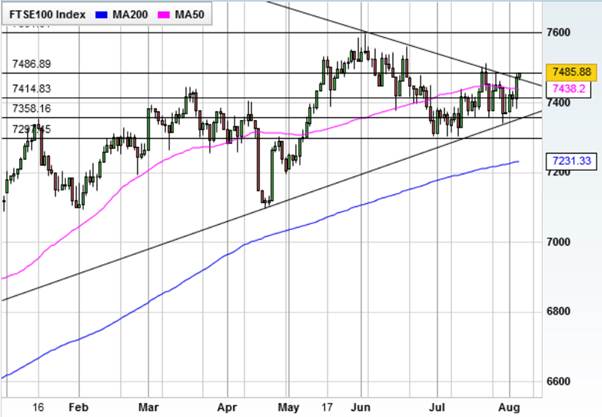Corporate earnings bring FTSE 100 to life
4th August 2017 13:32
by Lee Wild from interactive investor
Share on
There's been plenty to cheer over the past few days. A sweep of positive corporate earnings, the likelihood that UK interest rates will remain glued to record lows deep into next year, and a slightly weaker pound all gave stocks a lift.
High street retailer stole headlines with better-than-feared second-quarter results. It typically plays down expectations - a classic under-promise, over-deliver approach - which explains the double-digit percentage gains.
Buyers are still piling in 24 hours later, keeping the share price near 10-week highs. There is still much to be wary about with bricks and mortar retailers, but investors clearly believe there's a read-across here, which explains an uptick at fellow laggard .
Insurers and are back in favour after the former published stellar results. Rebasing its dividend for the first time since its IPO five years ago also went down well.
Resurgent utilities and are also hanging onto gains triggered when broker RBC upgraded the pair early in the week, believing generous dividends are sustainable.
US jobs data this afternoon put a rocket under equity markets, too. Hearing that US non-farm payrolls rose 209,000 in July, ahead of the 180,000 pencilled in by Wall Street, sterling sank to a one-week low. It’s why the FTSE 100, dominated by overseas earners, broke above 7,500 for the first time in a fortnight.
However, the remains rangebound, and it's difficult to identify an obvious catalyst in this seasonally quieter period to trigger much by way of serious upside.

Standout underperformer has been medical products firm . Its second-quarter results raised questions about margins, which were weaker than expected, and disappointing top-line growth in most of the divisions.
Management says things will improve in the second half, but traders want proof before buying in. That's why the share price is down around 20% from its June peak at a four-month low.
recovery after its most recent profits warning has come unstuck. We knew it planned to slash the dividend, but it looks bad when you see it on paper. A 5p interim payout is positively anaemic next to last year's 18p.
It will be a long time before shareholders see those kind of returns again, certainly while the US higher education business struggles.
There's more bad news for 3,000 Pearson staff, too, as chief John Fallon wields the axe again to tackle the cost burden. By the company's own admission, the second half will be "critical". Investors will have learned not to expect much.
This article is for information and discussion purposes only and does not form a recommendation to invest or otherwise. The value of an investment may fall. The investments referred to in this article may not be suitable for all investors, and if in doubt, an investor should seek advice from a qualified investment adviser.